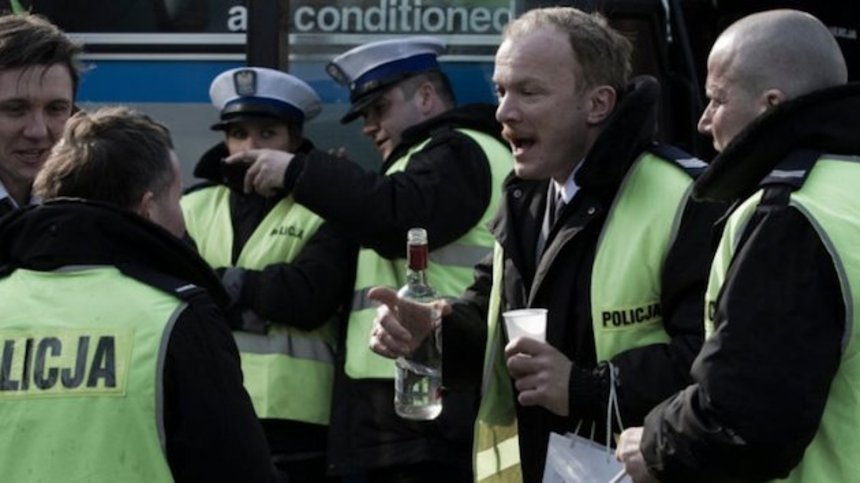Review: TRAFFIC DEPARTMENT Boldly Exposes The Dark Side Of Police Work

Never far from controversy, Smarzowski's unflinching directorial eye became the key to his huge success. In just four films he established an unmistakable style, which distinguishes him from other modern Polish auteurs. Amid accusations of being inappropriate and plain rude, Smarzowski proved how valuable it is to have one's own sense of self-determination. Even though his films are definitely not to everyone's taste, they're nevertheless works of an individual capable of being a perceptive observer of the world that surrounds him.
Ironically, Traffic Department, a picture that ponders a seemingly serious and dangerous topic, becomes a revealing and brutal tragicomedy with tendency to over-moralize. Smarzowski's aggressive and hard-hitting examination of the darkest side of Warsaw's own police force never fully explains its contentious statements, all brought up to life in a series of disorderly cut sequences. Though sharply edited, the supposedly random order of all the following clips might often make them seem out of place, when in fact they're in perfect accordance with the nature of the ever-changing narration. Relying almost solely on raw and visceral experiences, Traffic Department almost immediately becomes the fast-paced, forceful picture that aspires to touch most of the senses.
Shaky cameras bring the viewer closer to action, while screechy and scratchy background music intensifies the feeling of roughness that permeates the screen almost all the time. Wide shots are a rarity, but a bigger picture is not needed. Policemen on duty capture everything that must be seen - and often more than that - making the structure not clearer, but even more confusing. Those realistic and exploratory amateur recordings serve their purpose as precious materials both for fighting with corruption and for corrupting others.
Smarzowski is not only true to his style, but also to the people that he picks for all his features. Once upon a time he chose a bunch of actors who suited his vision and made them his regulars. They know exactly how Smarzowski works and vice versa, and that's probably what keeps the collaboration at an adequately fruitful level. In Traffic Department this complete mixture of miscellaneous individuals comes very close to achieving perfection. Even the smallest cameos put a smile on the viewer's face.
What's obviously curious about this picture is that an ordinary moviegoer can't be really sure if the atrocious and troubling events might take place on a daily basis, just behind his back. Smarzowski once again proves that he's a deceitful storyteller and his intentions aren't always evident. He comments on the condition of Polish National Police by stripping it of its dignity, shedding some light on the growth of moral decay.If End of Watch was a sort of turning point in the history of crime fiction, then Traffic Department should have a significant impact on its further development as well.
It's not really the simple story that counts here, but the unconventional way, in which it's portrayed. Bold and striking imagery mixed with a substantial amount of vulgar, yet powerful energy combines for a convincing bag of confessions and revelations. One sin only encourages another and the viewer realizes that he gets more than he bargained for after it's too late to turn back. The finale, which is also the most ironic part of the film, not only brings the much-deserved comeuppance, but also somewhat washes away the dirt that's rooted in the story's genes. It's actually more than hilarious to observe the chaos happening on screen in the film's last minutes.
A gritty tale of crime, corruption, and failed reinforcement, Traffic Department hit right in the pleasure center of the action-hungry audience and became the highest grossing Polish film of 2013. In a year filled with features that tried to deal with similar themes in a more or less coherent fashion, Smarzowski used given material to its full potential and beat the competition in a rather easy fight. The Closed Circuit was too naïve for its own good, while Vulture went overboard with its simplistic mannerisms. By staying in his comfort zone Smarzowski created an almost surrealist vision of a world, where black always means black and nothing else.
Traffic Department
Director(s)
- Wojciech Smarzowski
Writer(s)
- Wojciech Smarzowski
Cast
- Bartlomiej Topa
- Arkadiusz Jakubik
- Julia Kijowska
- Eryk Lubos

Do you feel this content is inappropriate or infringes upon your rights? Click here to report it, or see our DMCA policy.






